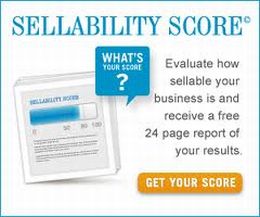As a business owner, you understand the impact of supply and demand: When supply increases, without a corresponding increase in demand, prices fall and a buyers’ market ensues. That’s the potential scenario on the horizon and approaching fast for business owners who plan to exit their businesses in the new few years. And this may not be good news for most business owners. But there are tangible solutions to strengthen the owner’s position.
There are many figures and statistics cited regarding the number of business owners who plan to sell in the next five to ten years. An in-depth study by Carey McMann, SME Research LLC1 concludes that the estimate of businesses that will be available for sale (with owners 45 years old or older in 2012) in the next ten to twenty years will be 2.5 to 3.8 million firms, and that 50 to 75 percent of owners will want to sell their businesses.
Statistics aside, common sense supports it. Baby Boomers are reaching retirement age. This generation has always put pressure on the economy and the country. Schools expanded dramatically to accommodate their numbers; the work force expanded with greater numbers of employees than ever; and now the bulge it hitting the retirement phase. An overwhelming majority of businesses are owned by someone 45 or older (70%), and the number of businesses owned by someone 55 or older is still a whopping 37%.1
There are going to be a lot of businesses on the market as owners sell to fund their financial goals or transition to the next adventures in their lives, possibly putting downward pressure on sales prices and salability.
Other Impacts
It’s estimated that an increasing number of businesses that would have transferred within the family will end up on the open market instead, adding to the pricing pressure and competitive marketplace. Reasons for the change include lack of expertise, funding, or the skill set needed to run the business. Additionally, surveys indicate that fewer and fewer family members are interested in taking on the family business. According to a PriceWaterhouseCoopers Family Business survey, 72 percent of business owners reported that they intended to pass their businesses on to the next generation in 2007; however, four years later, that number fell to 55 percent.2
Also impacting business valuation is the employee pool. With a downturn in the number of employees entering the workforce (compared to the Baby Boom era), it’s more difficult to find and retain valuable employees, and skilled employees are a key component to running a smooth operation and ultimately play a factor in determining business stability and potential value.
The competitive landscape of business value and sale could have a serious impact: delayed funding of potential retirement or reduced net proceeds limiting the ability to reach financial goals.
Planning is Critical
The majority of business owners have not developed an effective plan or any plan at all in some cases. In fact, 96 percent of business owners agreed that having an exit and succession strategy is important, yet… 87 percent did not have a documented exit plan.3 Failure to plan could be disastrous in this era of Baby Boomer business transition. In order to be attractive to buyers or to preserve your business for future generations, you must create a sound exit plan.
The scenario is parallel to real estate sales. When there are plenty of houses on the market, yours must be spotless, perfectly maintained, and free of potential headaches to attract the buyer and price you want. With a lot of houses (or businesses) on the market and plenty to choose from, it’s easy for the buyer to look elsewhere or they’ll have the upper hand in negotiating price.
Planning is critical as is timing. You cannot control market conditions that may affect business valuation or the potential buyer pool, but with a sound plan, you will be better positioned to move when factors are pointing in the right direction and realize maximum value. Additionally, if you wait too long without a solid exit plan, unforeseen events, like a health crisis or loss of a major account or key employee(s), will likely diminish value.
Adding Value
Buyers’ perceived risk plays a huge part in determining what they will be willing to pay. Increasing sales and business growth generate a premium price while falling or flat sales encourage discounted value. Additionally, the more integral you are as the owner to the success of the business, the greater the risk to the buyer. Along those same lines, the more your company’s projected earnings rely on future new sales, the less transaction value you can expect.
You can increase your business value by strengthening the right value drivers. Failure to understand and address these value drivers may become costly at the time of transition. This high-payoff planning can be powerful in adding to your net worth. It’s very possible to significantly increase business value by focusing on value drivers across all facets of the business including operations, financials, investments, sales, marketing, and business intangibles.
There are many steps you can begin taking now to increase business value, even if your plan to transition out is a few years in the future.
The greater the perceived value of your business (and less perceived risk on the part of potential buyers) will put you ahead of the competition you may be facing. Having multiple buyers interested in your business, as with having multiple buyers interested in your real estate property, greatly impacts your selling price. Exiting at the right time, when market conditions are most favorable, also impacts the price of your business.
You can only achieve these with proper planning, and now is the best time to start. The competition may be gaining on you.
- “Baby Boomer Business Owners: Will There Be A Mass Sell-Off,” by Carey McMann, SME Research LLC, Sept. 2012
- Choosing your next big bet, PwC Family Business Survey 2010/11 (http://www.pwc.com/en_US/us/private-company-services/assets/pwc-family-business-survey-us-report-2010-11.pdf)
- “America’s Entrepreneurialist Generation: Exit Planning and the Baby Boomer Age Wave” conducted by CMI Research, 2008





